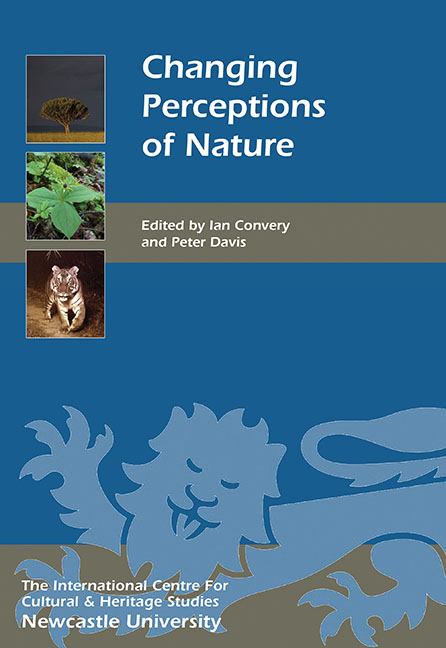Book contents
- Frontmatter
- Contents
- List of Illustrations
- Acknowledgments
- List of Abbreviations
- Foreword
- Introduction
- HISTORICAL PERSPECTIVES ON NATURE
- COLLECTING NATURE
- INTERPRETING NATURE AND LANDSCAPES
- CONSERVING NATURE
- 18 The Public Perception of Protected Areas in the UK
- 19 Conservation of Rare Species and Natural Heritage: the Wild and the Tame
- 20 Our Vanishing Natural Heritage and The Wildlife Trusts: a Century of Influence and Local Action for Nature and People
- 21 A Champion of the Tiger's Cause
- PEOPLE–NATURE INTERACTIONS
- List of Contributors
- Index
- Miscellaneous Endmatter
21 - A Champion of the Tiger's Cause
from CONSERVING NATURE
Published online by Cambridge University Press: 26 October 2017
- Frontmatter
- Contents
- List of Illustrations
- Acknowledgments
- List of Abbreviations
- Foreword
- Introduction
- HISTORICAL PERSPECTIVES ON NATURE
- COLLECTING NATURE
- INTERPRETING NATURE AND LANDSCAPES
- CONSERVING NATURE
- 18 The Public Perception of Protected Areas in the UK
- 19 Conservation of Rare Species and Natural Heritage: the Wild and the Tame
- 20 Our Vanishing Natural Heritage and The Wildlife Trusts: a Century of Influence and Local Action for Nature and People
- 21 A Champion of the Tiger's Cause
- PEOPLE–NATURE INTERACTIONS
- List of Contributors
- Index
- Miscellaneous Endmatter
Summary
This chapter details how my grandfather, the photographer and conservationist F W Champion (1893–1970), campaigned for the protection of tigers in India during the 1920s and ’30s. It is based on his books, diaries, conversations with my family and a recent six-month trip to India, where I retraced my grandfather's footsteps to explore his life and contribution to natural history.
We had only gone a few paces when once again the tiger shot out and vigorously slapped a beater across the head, tearing away half his scalp. As he fell, the tiger jumped onto his back and tore his coat to shreds, springing round again and biting viciously at his legs. None of us dare shoot lest we perchance hit the beater. But in the next second, the tiger leapt off and as he did so, two reports rang out into the silent forest air. The tiger fell to the ground writhing in its death struggles, rolling to the bottom of the valley and lying still. My shot had gone through its heart and my brother's through the head. Cautiously we approached, and then we had the only joke of the day. We discovered that my brother's shot of the previous evening had broken the jawbone, and this alone had saved our lives. But danger has its thrills and consequently its attractions, and the incident has only made me long for a repetition of similar excitement. It is not courage, it is just madness – but it is an ecstatic madness withal.
(Niblett n.d.)The tigress described so vividly above met her end not because she was a man-eater, but simply to satisfy the bloodlust of two young gentlemen, and suffered a grim and painful night of suffering before she faced the final bullet. Such attitudes towards wild creatures were the norm in India throughout the eighteenth, ninetenth and early twentieth centuries, but one early conservationist, Frederick Walter Champion (1893–1970), took on the task of challenging such behaviour, pre-dating other ‘reformed hunters’ such as Jim Corbett.
F W Champion (FWC) became one of India's first campaigners for wildlife protection at a time when his contemporaries saw large mammals as targets for the rifle rather than as creatures with a right to exist.
- Type
- Chapter
- Information
- Changing Perceptions of Nature , pp. 213 - 224Publisher: Boydell & BrewerPrint publication year: 2016



